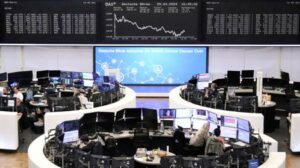By Jihoon Lee
SEOUL (Reuters) – South Korea’s factory production jumped unexpectedly in May, led by cars and chips, official data showed on Friday, while retail sales and facility investment also rose in an encouraging sign for a slowly recovering economy.
The industrial output index rose 3.2% in May on a seasonally adjusted monthly basis, Statistics Korea data showed, compared with a fall of 0.6% in April and a decline of 0.8% tipped in a Reuters survey.
The gain also topped the poll’s highest estimate of a 2.8% rise.
By product, output of automobiles jumped 8.7% and semiconductors rose 4.4% over the month, whereas communication devices slumped 16.9%.
Factory output fell 7.3% on an annual basis, which was also milder than a 9.0% drop in April and an 8.4% decline expected by economists.
The finance ministry said the data showed the economy was on a recovery path after a slight correction the previous month. Downward pressure has eased though risk remains, it added.
Factory output will rebound in the second quarter after four consecutive quarters of loss as exports bottom out, the ministry said.
“We believe Korea’s Q2 GDP (second-quarter gross domestic product) will recover a bit more than we had expected,” said economist Kang Min Joo at ING Economics.
“But forward-looking orders, signs of softening retail sales and service activity, and an unfavourable inventory cycle will likely weigh on manufacturing, consumption, and investment in the second half of 2023,” Kang said.
South Korea’s heavily trade-reliant economy barely averted a recession with growth of 0.3% in the first quarter, after contracting in late 2022 for the first time in 2-1/2 years.
The all-industry production index, which includes both manufacturing and services sectors, rose 1.3% in May from a month earlier, recouping April’s 1.3% decline.
Retail sales rose 0.4% in May, after dropping 2.6% in April – which was the worst in five months – while facility investment jumped 3.5%, the most since August.
(Reporting by Jihoon Lee; Editing by Jacqueline Wong and Christopher Cushing)





